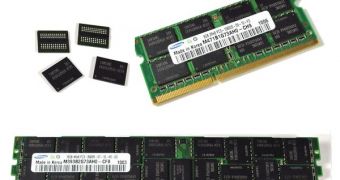Even though the back-to-school season has kicked off, demand for PCs and hardware in general seems to still be rather weak, weak enough for makers of DRAM products to even further cut the contract prices on their chips.
The supply of DRAM products is definitely not the issue currently plaguing this market segment if a recent report made by Digitimes is anything to go by.
In fact, more and more producers of DRAM are moving on to more advanced manufacturing process technologies.
Samsung, for instance, is mass-producing chips based on the 40nm process, and this will reduce the contract price of 2Gb chips to as little as US$1.50, according to sources cited by the report.
It was the head of Samsung Electronics' chip division that supposedly suggested the further drop in DRAM prices and weaker sales of PCs.
The main fear is that the segment will be faced with oversupply until the first quarter of 2011, leaving price cuts as the only means of increasing product appeal.
Digitmes notes that, according to DRAMeXchange data, spot prices for effectively tested (eTT) and branded DDR2 chips of 1Gb are selling for less than US$2 already.
Additionally, DDR3 chips of equal density have an average selling price of between US$2.20 and US$2.30.
The ongoing competition over die shrinking is, unfortunately, expected to further affect production costs as the various chip developers attempt to more quickly move on to smaller nodes.
The other prime factor behind the demand decline is the sales slowdown in Europe and the US.
Granted, the fall in DRAM prices may encourage PC makers to put higher capacities inside their system, of 4GB or more to be exact, but this is not exactly applicable to PCs from the lower half of the PC market.
With this bleak outlook, those affected have no choice but to hope for demand to rise in the enterprise sector, though whether prices stabilize by year's end remains uncertain.

 14 DAY TRIAL //
14 DAY TRIAL //